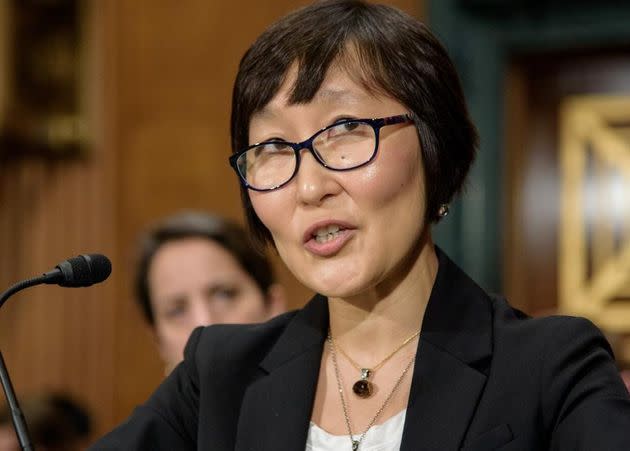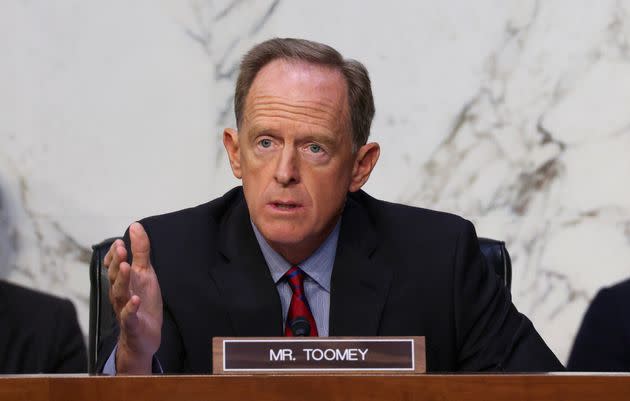Biden’s Bank Regulation Nominee Is Facing A 'Red Scare McCarthyism' Campaign

Republicans and bank lobbyists are trying to derail the nomination of Saule Omarova, a financial law expert at Cornell University, to head the Office of the Comptroller of the Currency, which oversees banking regulation. Their main line of attack is not about her qualifications but about her place of birth: the former Soviet Union.
In a speech on the Senate floor, Pennsylvania’s Pat Toomey, the top Republican on the Senate Committe on Banking, Housing and Urban Affairs, attacked her as the most “radical choice for any regulatory spot in our federal government” he had ever seen. He pointed to her academic writings in support of providing Americans with bank accounts through the Federal Reserve and authorizing a National Investment Authority to guide a national industrial policy. He insinuated her true motives resulted from her place of birth in Kazakhstan in 1966, then a part of the U.S.S.R.
“Where would a person even come up with these ideas?” Toomey asked. “How does it even happen that it occurs to someone to think of these things? Maybe a contributing factor could be if a person grew up in the former Soviet Union and went to Moscow State University and attended on a V.I. Lenin academic scholarship.”
He then called on her to release her 1989 thesis from Moscow State University titled, “Karl Marx’s Economic Analysis and the Theory of Revolution in The Capital,” in “the original Russian.”
Sen. Sherrod Brown (D-Ohio), the chair of the banking committee, fired back hard against Toomey’s insinuations.
“Before today, I thought red scare McCarthyism was rightly relegated to the dustbin of history,” Brown said in a statement on Oct. 6. “Any American citizen who fled communist repression — whether it be FDIC Chair Jelena McWilliams or OCC nominee Saule Omarova — should be lauded for their courage and conviction. I believe that my colleagues — from both sides of the aisle — will reject such character assassinations.”
Toomey’s comments echoed those pushed by anti-Omarova forces including bank lobbyists, conservativemedia and even a far-right racist conspiracy site insinuating that Omarova is a secret communist seeking to destroy American capitalism from the inside.
The Senate Must Defeat Communist Saule Omarova For Comptroller of the Currency - The Capitol Switchboard is (1-866-220-0044) call today & tell your Senators to vote NO on Communist Saule Omarova, President Biden’s nominee for Comptroller of the Currency https://t.co/vrgewQVvTU
— Richard Viguerie (@RichardViguerie) October 4, 2021
These attacks highlight policies she would have no oversight of as comptroller, take tweets and other social media posts out of context to paint her as an apologist for Soviet communism and insinuate that her foreign birth and partial education in the former Soviet Union is inherently subversive. As is always the case with xenophobic red scare tactics like these, they are deployed to obscure the actual reasons why the financial industry and conservatives oppose her nomination.
The real Saule Omarova is not a communist sleeper agent seeking to eradicate private property, but an emigrant from the former Soviet Union who initially came to the U.S. as part of a student exchange program between the U.S. and the U.S.S.R. negotiated by President Ronald Reagan and Soviet President Mikhail Gorbachev.
“She is the most patriotic person I know,” Patricia McCoy, a financial law expert at Boston College of Law and a friend of Omarova, said. “She chose to become an American citizen. Most of us who are born in the United States, we don’t choose it. But she made an active moral choice to be an American patriot.”
After getting her Ph.D. in political science at the University of Wisconsin-Madison and law degree from Northwestern University, she went to work as a white shoe bank lawyer at Davis Polk & Wardwell and then served as a special adviser at the Treasury Department in the George W. Bush administration before teaching at the University of North Carolina and then Cornell University law schools.
They’re resorting to this just because she’s one of the best minds we have in the area.Raúl Carrillo, associate research scholar at Yale Law School
“What really drives the hysterical bank lobby opposition is that Omarova is an experienced bank lawyer and policymaker who worked alongside banks and Republican Treasury officials, and she knows where Wall Street buried all the bodies,” Carter Dougherty, communications director for Americans for Financial Reform, said. “She knows its secrets.”
Omarova has written deeply and widely on the weakness of internal bank regulation and governance and how public regulators have enabled their behavior.
“They’re resorting to this just because she’s one of the best minds we have in the area,” Raúl Carrillo, an associate research scholar at Yale Law School, said.
Omarova’s 2009 investigative law review article, “The Quiet Metamorphosis: How Derivatives Changed the ‘Business of Banking,’” is particularly relevant to why banks may not want her as their top regulator.
The 2008 global financial crisis was not a natural event, she argues in the paper, but “a product of policy choices and decisions by regulatory agencies” that “escaped public scrutiny because they were made in the subterranean world of administrative action invisible to the public.”

The Office of the Comptroller of the Currency in particular, through agency interpretations and guidance, slowly and meticulously opened the door for banks to engage in the trading of complex derivatives, like collateralized debt obligations, beginning in the 1980s. This, combined with actions taken by the Federal Reserve and other agencies, helped turn banks into too-big-to-fail gamblers.
“This was the full opening of the Wall Street casino,” Dougherty said.
And Omarova opposed giving banks a seat at the table. One reason: Banks and other financial institutions lack the internal capacity or culture necessary to avoid risky behavior that would ultimately harm the public, she argued in another paper.
“[T]he events of the last decade revealed pervasive patterns of corrupt behavior and systematic indifference to the public costs of excessive risk-taking on the part of large financial institutions,” she wrote in a 2018 paper “Ethical Finance as a Systemic Challenge: Risk, Culture, and Structure.”
“One of the most troubling revelations in this respect was that, in the vast majority of these cases, banks’ and their employees’ socially harmful and ethically questionable business conduct was perfectly permissible under the existing legal rules,” she added. “In each of those instances, bankers voluntarily, and often knowingly, chose to pursue a particular privately lucrative but socially suboptimal business strategy.”
As comptroller of the currency, Omarova could issue agency guidance deterring or scaling back risky trading practices by banks while encouraging productive investment in infrastructure or other areas that serve the public. With a seat on the Financial Stability Oversight Council, she could also demand stricter stress tests for banks deemed systemically important ― another way of saying “too big to fail” ― and stronger internal governance standards to ensure banks, big and small, do not need to be bailed out in the future.
If confirmed, she would enter the OCC as it reviews and revises rules put in place during the Trump administration that gutted the Community Reinvestment Act, which is meant to prevent discrimination by banks in the housing markets and encourage lending to traditionally underserved communities. She could have a significant impact on setting new rules and standards to increase lending to these communities while preventing lenders from taking advantage of them.
She would also have some say over newer industries like cryptocurrency, fintech and big technology platform companies, like Facebook, as they seek to perform bank-related activities. The issue is a live one as Brian Brooks ― former President Donald Trump’s second OCC nominee, serving in an acting role ― issued a charter in 2020 enabling fintech and cryptocurrency companies to provide lending and payment services without having to submit to state banking regulators or federal deposit insurance rules. (Brooks has gone on to work for fintech companies since leaving office.)
Omarova, who has written about the dangers of letting these new industries perform banking functions absent regulation, would not have too many options to regulate them. What she could do, according to Carrillo, is withdraw the 2020 charter and “make them walk through the front door like everyone else.”
Omarova’s belief that banks should work to invest in projects that advance the public interest is a break from past comptrollers who have largely been acquiescent to industry interests. Former Comptroller Joseph Otting, a former banker appointed to the position by Trump, referred to banks as his “customers.” And almost every past comptroller worked directly for banks prior to their appointment or went to work for them after they left office.
“Not only is she refreshingly independent and unconflicted — something bank lobbyists find threatening — but she comes to the job with a uniquely deep appreciation for the opportunities made possible by the US financial system,” dozens of Omarova’s peers in the banking and financial law community wrote in a letter to the Senate banking committee endorsing her nomination.

Omarova’s nomination also stands out for another reason: She would be the first woman and first nonwhite person appointed to the position in a non-acting role. Some of her supporters see bias in the virulent red-baiting targeting her nomination from an industry whose upper echelons are still dominated by white men.
“They’re doing that because she’s a woman, an immigrant and she’s a woman of color,” Tracey Lewis, senior climate financial advisor at the consumer watchdog nonprofit Public Citizen, said.
Omarova joins other nonwhite women appointed by President Joe Biden, like Vanita Gupta and Kristen Clarke, in being painted as “radical” and outside of the mainstream by Republican senators.
And yet Omarova’s positions on banking in the 21st century are, in a way, fundamentally conservative. She opposes overly risky behavior in banking, questions the increased concentration in the industry, believes new actors must submit to the same rules as older institutions and wants banks and other financial institutions to engage in productive activity instead of the risky activity that caused significant social harm in the past two decades.
“If they tried to engage this on its face, and if they tried to flat out say banks should be allowed to make crazy financialized bets that can wreck the economy, there’s no way they can win that argument,” said Max Moran, a research assistant at the Revolving Door Project at the Center for Economic and Policy Research.
And so the opposition has resorted to a classic method of character assassination, red-baiting, to stop the nomination of a regulator who would not treat banks as her “customers.” The Second Scare in the 1940s and 1950s, which culminated with Republican Sen. Joseph McCarthy’s conspiratorial delusions, was specifically aimed at rooting out regulators and bureaucrats who successfully implemented regulations to strengthen democracy at home.
“[T]he Second Red Scare curbed the social democratic potential of the New Deal through its impact on policymakers who sought to mitigate the antidemocratic tendencies of unregulated capitalism,” Landon R.Y. Storrs writes in his 2013 book, The Second Red Scare and The Unmaking of the New Deal Left.
Supporters of unregulated capital like Toomey and bank lobbyists are just working from the same old playbook.
This article originally appeared on HuffPost and has been updated.

